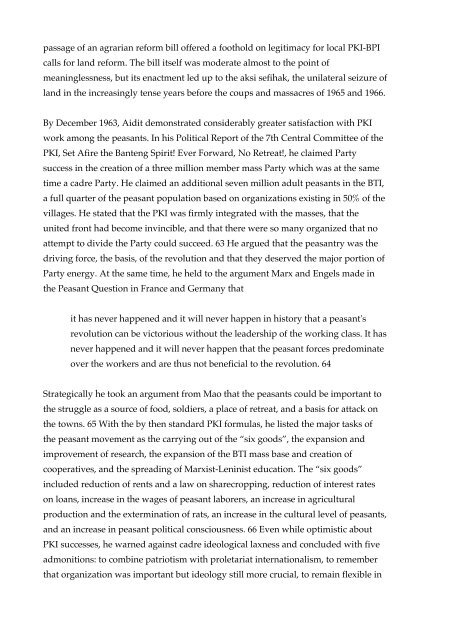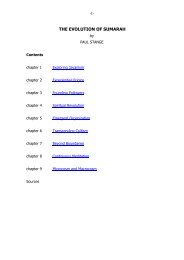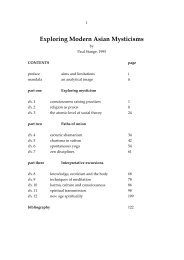Javanese Mystical and Marxist Dialectics - Paul Stange
Javanese Mystical and Marxist Dialectics - Paul Stange
Javanese Mystical and Marxist Dialectics - Paul Stange
You also want an ePaper? Increase the reach of your titles
YUMPU automatically turns print PDFs into web optimized ePapers that Google loves.
passage of an agrarian reform bill offered a foothold on legitimacy for local PKI-BPIcalls for l<strong>and</strong> reform. The bill itself was moderate almost to the point ofmeaninglessness, but its enactment led up to the aksi sefihak, the unilateral seizure ofl<strong>and</strong> in the increasingly tense years before the coups <strong>and</strong> massacres of 1965 <strong>and</strong> 1966.By December 1963, Aidit demonstrated considerably greater satisfaction with PKIwork among the peasants. In his Political Report of the 7th Central Committee of thePKI, Set Afire the Banteng Spirit! Ever Forward, No Retreat!, he claimed Partysuccess in the creation of a three million member mass Party which was at the sametime a cadre Party. He claimed an additional seven million adult peasants in the BTI,a full quarter of the peasant population based on organizations existing in 50% of thevillages. He stated that the PKI was firmly integrated with the masses, that theunited front had become invincible, <strong>and</strong> that there were so many organized that noattempt to divide the Party could succeed. 63 He argued that the peasantry was thedriving force, the basis, of the revolution <strong>and</strong> that they deserved the major portion ofParty energy. At the same time, he held to the argument Marx <strong>and</strong> Engels made inthe Peasant Question in France <strong>and</strong> Germany thatit has never happened <strong>and</strong> it will never happen in history that a peasant'srevolution can be victorious without the leadership of the working class. It hasnever happened <strong>and</strong> it will never happen that the peasant forces predominateover the workers <strong>and</strong> are thus not beneficial to the revolution. 64Strategically he took an argument from Mao that the peasants could be important tothe struggle as a source of food, soldiers, a place of retreat, <strong>and</strong> a basis for attack onthe towns. 65 With the by then st<strong>and</strong>ard PKI formulas, he listed the major tasks ofthe peasant movement as the carrying out of the “six goods”, the expansion <strong>and</strong>improvement of research, the expansion of the BTI mass base <strong>and</strong> creation ofcooperatives, <strong>and</strong> the spreading of <strong>Marxist</strong>-Leninist education. The “six goods”included reduction of rents <strong>and</strong> a law on sharecropping, reduction of interest rateson loans, increase in the wages of peasant laborers, an increase in agriculturalproduction <strong>and</strong> the extermination of rats, an increase in the cultural level of peasants,<strong>and</strong> an increase in peasant political consciousness. 66 Even while optimistic aboutPKI successes, he warned against cadre ideological laxness <strong>and</strong> concluded with fiveadmonitions: to combine patriotism with proletariat internationalism, to rememberthat organization was important but ideology still more crucial, to remain flexible in




